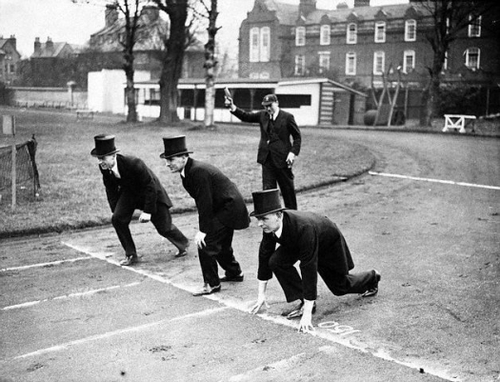
Second installment then, following on from yesterday's bit about Modern Cambridge - today, we look at what the writer makes of the 20th century architecture and spaces of a rapidly changing Cambridge.
The University Library
Walking due west from Market Hill, across King's Parade, down Senate House Passage, through Clare, over the bridge, along the avenue and on to the other side of the Backs Road, we enter the presence of the most controversial building Cambridge has had for generations: the New University Library.
To begin with, it has administered a violent shock to the Cambridge centre of gravity. Hitherto, that has traditionally been in the group formed by the Old Library, the Senate House, King's Chapel and the University Church of St Mary. The University Library is by its nature the cathedral of intellectual life, and the old site was the physical as well as the intellectual centre. The new site implies a new focal point across the river and widely separated from the rest of the university. That in itself was something of a disturbance, but the actual buildings are even more disturbing, for they have changed the whole balance of the panorama.
The main cause of trouble is the tower. Not only is it an unbeautiful object in itselcf, but there is no means general agreement on the necessity of a tower at all. With the tower placed at one end of the facade the trouble would be lessened, and with the tower left out altogether it would be lessened even more. But there would still remain the long narrow windows, running up from ground to cornice... they give the effect of a warehouse. In a sense, perhaps, a library is a kind of warehouse. But in a University Library, some observance of tradition and some reference to the Humanities might not be altogether out of place.
The interior looks, and doubtless was, very costly.
Cambridge has not taken kindly to its New Library and it is difficult to imagine future generations regarding it with affection. Still, taste performs its curious revolutions, which generally take about a century. Caius is due to be much admired by the avant-gardists of some twenty of thirty years hence, and perhaps the library will come into its own around the year 2020. By then, of course, some far worse things will have been put up.
Downing Site and New Museums Site
Its great characteristic is opulent heaviness, with an extraordinary mixture of Edwardian vulgarity and undigested learning... This extraordinarily depressing area is one of the most intense concentrations of scientific knowledge in England...Nobody would imagine, if he did not already know, that these meaningless shapes are really laboratories and museums which draw students and scholars from over the whole world. There are however, one or two of these institutions which do not actually hurt the critical spectator.






